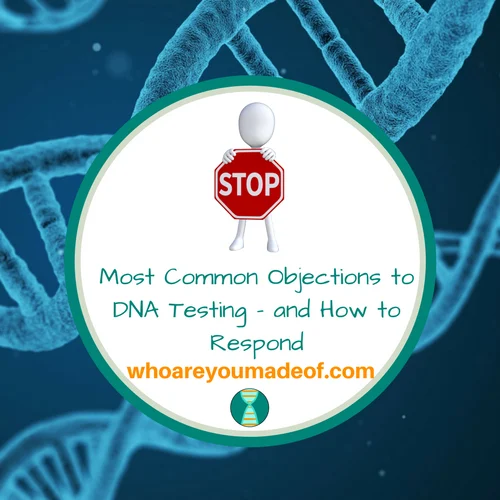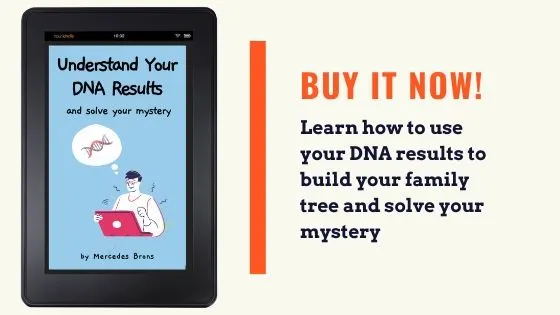Here, you will learn the most common objections to DNA testing and responses that you can use to help your family member or friend get a better understanding of the amazing world of genealogical DNA testing. This is the best way to help them understand what they might be able to learn from taking a DNA test, even if one of their relatives has already tested.
Are you considering asking a relative to do a DNA test to help you with your research, or to figure out exactly how you are related to them? There so many great reasons to do a DNA test, but sometimes it can be hard to find the right words, or to anticipate what your relative’s objections might be.

Or, maybe it’s you who has objections. You just might find yourself convinced at the end of this post.
Objection #1: “I already know about my family tree”
Ah, yes. The classic objection of the experienced genealogist.
I heard this objection from some of my own family members. If our grandparents, great-grandparents, and great-great grandparents have always been very interested in family history and they took the time to do extensive research on our roots, is a DNA test even worthwhile?
The answer to this question is a resounding “yes”! It is absolutely worthwhile to do a DNA test, even if you (think you) know everything about your family tree that you want to know.
At worst, your DNA test will just prove what you already knew. Wouldn’t it be great to have gobs of irrefutable scientific evidence to back up your family stories?
Don’t you want actual DNA evidence that you are, indeed, descended from a Mayflower passenger, your war hero, or the Native American great-great-great grandmother that your father told you about?
DNA can help do this for you.
But even more interesting is the idea that there is something in your family’s past that you don’t know about. Maybe most of your family tree is correct, but maybe there is one slight mistake that has caused an entire branch to be added incorrectly to your tree.
Maybe you have a mysterious ancestor whose DNA will show up in yours?
Objection #2: “My sister took a DNA test. Don’t we have the same DNA?”
This is a very common objection to taking a DNA test. In fact, my very own sister said this to me.
Needless to say, she got an earful about DNA inheritance and learned more than she probably ever wanted to know about the subject. She learned that two full siblings only share 50% of their DNA, at most.
We do not, in fact, have the exact same DNA as our siblings. Two full siblings will only share between about 33-50% identical DNA.
This means that there is a very substantial amount of DNA that your sibling has that you don’t have, and vice versa. Contained within the DNA that you don’t share are DNA segments that could possibly reveal an unknown trace ethnicity, or connect you with DNA matches that don’t match the sibling that has already tested, since we don’t share DNA with all of our relatives.
If you want to know more about the DNA differences between siblings, you can read my post about whether or not siblings have the same DNA.
Objection #3: “DNA testing is too expensive, isn’t it?”
Whether or not DNA testing is too expensive is relative. Additionally, you might not be aware that the cost of DNA testing has gone down significantly over the years because of so much competition in the industry.
You can now generally buy a genealogical DNA test for as low as $59, and most tests don’t cost more than $99.
If those prices are still too high, then maybe another relative could help pay for the test? DNA testing is an amazing gift for future generations, since once we are gone, so is our DNA and the information contained within in.
Our children only inherit 50% of our DNA, and even if we have many children, there will still be some DNA in our genome that we didn’t pass down to anyone. As technology develops further, there is going to be more that our children and grandchildren can learn from our DNA information, and so by testing, we are leaving a legacy for those among our descendants who are interested in exploring it.
Objection #4: “I don’t want DNA matches to be able to contact me”
Most autosomal DNA testing companies, like Ancestry DNA and 23 and Me allow you to “turn off” the DNA matching feature. Additionally, you can also use only initials or even a “username” when you register your kit in order to further protect your privacy. If your username is not the same as your real name, your DNA matches will not be able to figure out who you are – especially if you keep your family tree private.
Finally, if you don’t turn off matching, and you do get a message, you don’t have to respond to it. It’s okay!
Objection #5: “I’m afraid that my DNA data will be misused”
All of the DNA testing companies have very strict privacy rules and are very explicit about how your DNA data will be used. Depending on the company that you are interested in testing with, there is a chance that your data could be used for DNA research, but in this case, the data is “anonymized” and cannot be traced back to the person who gave the DNA sample.
The best thing to do in the case of privacy and data misuse concerns is to thoroughly research the company that you would like to test with, and find out what they say they will do with your DNA data. Some companies, like Ancestry DNA and 23andMe, give you the option to opt out of research studies.
Read my post about DNA privacy, if you would like to learn more.
Conclusion
I hope this post gave you some material to ponder when thinking about the most common objections to DNA testing. If you want to share your own experiences of objections you’ve heard and the best counter-response, I would love to hear from you in the comments below.
Thanks for stopping by!

